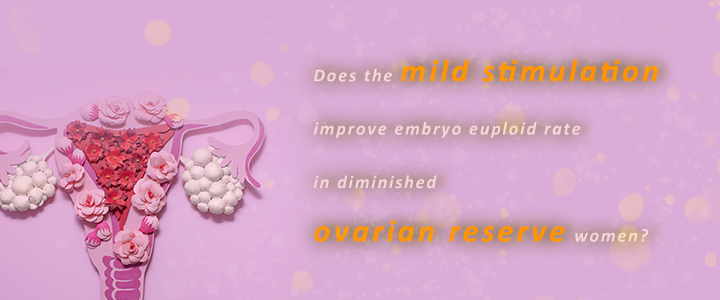
The psychological and financial burden of IVF increases while the ovarian function declines.
If the frequency of injection decreases, would the patients still have enough embryos for transfer?
Women with diminished ovarian reserve (DOR, which was defined as Anti-mullerian hormone < 2 ng/ml and Antral follicle count ≦ 5 here), are confronted with insufficient ovarian reserve. Although controlled ovarian stimulation (COS) is an efficient treatment for infertility, it involves costly injections for the purpose of retrieving more oocytes during a cycle. In order to evaluate the efficiency of different ovarian stimulation protocols in DOR patients, the chromosome constitution identified by using NGS platform was used as a parameter for assessing the embryo quality.
During January 2015 to June 2016, 52 patients (mean age: 38.1 years) with AMH < 2 ng/ml and AFC≦5, were randomly assigned to undergo strong stimulation (long-acting r-FSH and short-acting r-FSH with daily injections), or mild stimulation (short-acting r-FSH with every-other-day injections), or mini stimulation (clomiphene citrate only or natural cycle). A total of 139 embryos from 86 IVF/PGS cycles were biopsied on culturing day 5 or 6, and then analyzed on NGS platform (Miseq®).

Compared with strong stimulation groups, mild and mini stimulation groups result in fewer retrieved oocytes per cycle. (Strong:6.1# Ovum; Mild:4# Ova; Mini:1.9# Ova). Moreover, studied patients with advanced maternal age (≧38ys) undergoing mini stimulation showed a tendency to possess more embryos available for biopsy in total retrieved oocytes (Mini: 64.4% v.s. Strong: 35.9%). And the euploid rate of mild and mini stimulation groups were higher than that of the strong stimulation group (Mild plus Mini: 27.6% v.s. Strong: 20.8%). It is known that the euploid rate decreased with increasing maternal age, and mini stimulation seems to have the potential to improve the euploid rate in the patients with DOR.
The preliminary data suggests that different ovarian stimulation strategies could affect the number of retrieved oocytes and chromosomal abnormality of embryos. A friendly ovarian stimulation strategy should concern both the efficiency and the feeling for patients.


